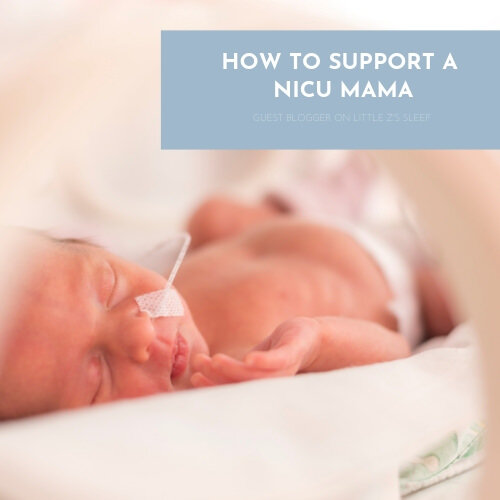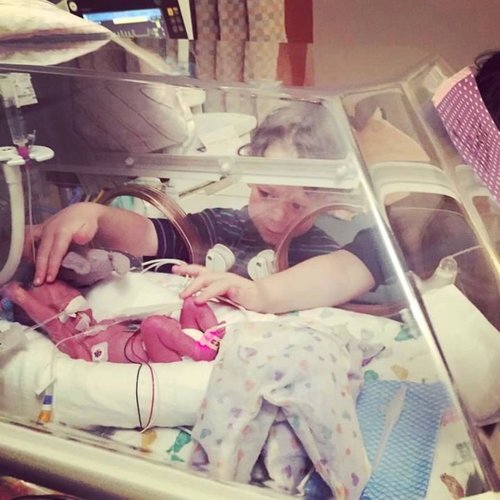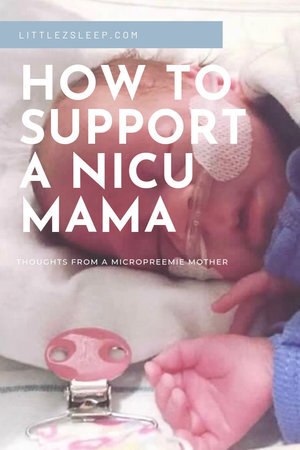
Hey ya’ll, Becca here. I’ve been looking forward to sharing this guest blog with you for quite some time. If you haven’t experienced the NICU (I haven’t) it can be hard to understand how to support a friend who has a baby in the NICU. Today, I’m so honored to share Jacqueline Sears’ thorough article on what you need to know about the NICU and how to support families in the NICU.
Jacqueline Sears is not only a former client of mine but also a friend. She holds a Master of Public Health, is Certified as a Breastfeeding Specialist and Certified in Public Health. Not to mention also has a degree in bio-medical engineering and was a childbirth educator and professional birth doula!! Jacqueline writes on niche topics related to pregnancy, birth, postpartum, work/life integration and intentional mothering. Her experience as a twice over NICU + Preemie mom has led to her passionate work to create Preemie support for families. Currently this looks like organizing Richmond Parents of Preemies. If you are a Richmond, Virginia area mom of a Preemie baby you’ll find all the resources to get in touch with Jacqueline at the end of this article! Thank you for sharing this important message with us, Jacquline!
You’ve probably heard of the Neonatal Intensive Care Unit (NICU), or maybe you or someone you know has parented a baby in the NICU. The NICU experience may be in your periphery as familiar from your favorite tv shows or news feed, and who hasn’t heard of at least one miracle baby who was born early and beat all the odds to grow up robust and 6 feet tall? For most parents the NICU is an afterthought when choosing a birthing place, writing a birth plan, or developing a postpartum plan—and for reasons that make sense—no one expects the worst to happen to them, and truly most babies will never need the services offered there. Still, when the unexpected happens to someone you love and a friend is journeying the NICU with their baby, it can be tough to know what to do, what to say, or how to help.
What you need to know:
As someone who cares, the first thing you can do to frame this situation is to understand that the events leading up to a NICU stay—the pregnancy, the birth—are often traumatic for parents as they experience a shocking loss of expectation. When a baby is admitted to the NICU the entire family unit is thrust into an ongoing crisis that extends beyond the baby to include employment, finances, marriage, and siblings. Some parents lose their child or children in the NICU. Grief, loss, fear, bereavement, and guilt can manifest in sadness, anger, feelings of failure, incompetence, powerlessness, and vulnerability. As Drs. Davis and Stein eloquently expand on in their book Parenting your Premature Baby and Child, parents in the NICU face three broad categories of emotional challenge that include: coping with their own intense feelings, developing their parental identity within the context of the NICU, and managing their relationships—with a partner, NICU staff, extended family, and circles of support. It is easy to imagine how overwhelming it could be to balance all this while understanding and advocating for your baby’s fluctuating health needs and how best to parent under these strained conditions.
While perinatal mood and anxiety disorders (PMADs) may affect up to 25% of new moms in the general population, data suggests that up to 70% of NICU moms experience some form of postpartum depression (PPD), postpartum anxiety (PPA), or post-traumatic stress disorder (PTSD). Many parents don’t realize the full impact of their experience or seek help until long after their babies have been discharged from the NICU, sometimes years later.
Anyone can have a premature baby or a baby who needs extra help in the NICU, but Black mothers are twice as likely to experience preterm birth. Black, Hispanic, and Indigenous mothers are at even higher risk for PMADs, and 2x less likely to receive treatment.
What you can do to help:
Validate their experience. One way to acknowledge the duality of emotion parents may feel is with a heartfelt, “Congratulations on your new baby! This must be really hard.” Don’t leave out recognizing the joyous parts or the terrifying parts—understand that there are many layers to their experience that must coexist.
Hold space for your friend. Holding space can take some practice, but the idea is that you walk this parenting journey alongside them without judgement and without trying to impact the outcome. Don’t feel that you have to have the answers or solutions. Listening, being present, and remaining open to wherever this path leads them may be the single most helpful thing you can offer.
Encourage them to listen to their intuition, and then follow their lead. Confidence in parenting while in the NICU and after discharge may be low. NICU parents become used to having a team of people around them, monitors and machines that gather data and tell them their baby’s status, and because their baby is medically fragile meeting their needs may feel like a mini puzzle that requires the experts. NICU babies are at higher risk for many complications that may only reveal themselves over time as the baby grows. The use of adjusted and actual ages can confuse a parent’s expectations for their baby’s development, and uncertainty can remain for years after the baby is born. Help them find their footing by trusting them and telling them so.
Support their decisions, respect their boundaries. Sometimes NICU parents have to make choices that are in the best interest of their baby’s health or in the best interest of their own self-care, which may or may not make sense to you—and that’s ok! Try to honor where they are on any given day and resist the urge to take it personally.
SOS!
It can be hard to ask for help and accept it when offered. YOU have an opportunity to make your friend’s journey better, just by being in their life during this difficult time. Here are a few specific ideas you can initiate on your own, or partner with them to make happen:
Visit them in the NICU if they want company. Ask how they are doing today—everything in the NICU can feel minute-to-minute. Don’t ask them questions that require them to ease your worries or fears. Don’t forget to take a loving gaze at the baby—tell them that their newborn is beautiful.
Share nutritious, comforting food. A warm meal can mean everything. Drop off breakfast, coffee, snacks for older siblings, or dinner. Offer to set up a meal train. The Neonatal Intensive Care Unit is an ICU, and no food is allowed on the floor. If you visit them in the NICU and want to share something delicious, bring it in a clearly labeled disposable container so it can be stored in the communal fridge and retrieved as needed.
Offer an extra set of hands: With life’s usual routines suspended, sometimes the basics can feel like herculean tasks. Offer to run errands, check-off a list of chores, or meal prep. Hang out or entertain older siblings so parents can get short periods of relief in the form of alone time to recharge and for self care activities like sleep. Go with the family to the NICU when a sibling visit is planned—a parent can keep focus on handling the baby outside of the isolette while you help with the big kids. After discharge, you can offer to care for the new baby for short periods in the home, so parents can spend quality time with older siblings. Make a point to avoid introducing any illness, decline to come if you or anyone in your family is sick, and always wash your hands upon arrival.
Encourage them to seek support: It can be really hard for parents in crisis to think much further beyond what’s right in front of them. It can also be hard for parents to recognize when they are in a dark place, or to pull themselves out of it in a conscious way while they are still in it. Encourage them to talk to someone they trust, seek therapy, find a support group, or connect with other NICU parents.
Send a Care Package: Time spent in the NICU can be grueling, and keeping a relentless schedule pumping around the clock, parenting older siblings, maintaining a sense of normalcy in life outside the hospital can feel like a heavy slog with no end in sight. Remember your friend who is working hard to hold it all together! Some ideas to include in a care package: a nice lip balm or hand lotion; ear plugs for naps in the NICU; a journal; a cozy nursing/pumping-friendly top, or pair of pjs (We love Latched Mama!); warm socks; or a gift card they can use toward a massage, online therapy, or postpartum doula support.
By implementing just a few of these ideas your friend will feel loved, supported, and capable to parent in the face of uncertainty and imperfect beginnings.

Jacquline’s sons checking in on baby sister
Resources for Richmond Area Preemie Parents
About Richmond Parents of Preemies:
Richmond Parents of Preemies is an All Volunteer-run local resource providing support, advocacy, and community for parents and caregivers of babies born prematurely.
The mission of Richmond Parents of Preemies is to empower parents and caregivers with evidence-based information and local services; to lessen the mental health impact of parenting in the neonatal intensive care unit (NICU) and beyond through Richmond Parents of Preemies Connect, a NICU family support circle and online community; and to advocate for a committed effort to end social and racial inequalities which are fundamental causes of persistent birth outcome disparities .Richmond Parents of Preemies strives to be an inclusive community resource for all of Richmond’s families in all their different forms.
Our families have experience unique to preterm birth and parenting in the NICU, however, these communities are open to all parents and caregivers of NICU babies, no matter the journey.
Every month RPP hosts a peer-led, clinician supported community circle for NICU parents; A BRAVE space for NICU parents at every stage to find community, encouragement and hope in their parenting journey. We are currently working to bring this model to local NICUs.
Facebook: https://www.facebook.com/richmondparentsofpreemies
Website: http://www.richmondparentsofpreemies.com
******************************************************************************
Richmond Parents of Preemies Connect
A peer-to-peer, clinician supported NICU Parenting Community Circle
What: A BRAVE space for NICU parents to find community on their parenting journey
When: The last Tuesday of every month, 600pm-730pm
Where: MyBirth’s Community Studio (1726 Altamount Ave. Suite 2. Richmond Va. 23230)

Jacqueline Sears, MPH, CPH, CBS is a homeschooling mama to three and has given birth early twice—her son Merritt was born at 33 weeks and her daughter Winslet was born at 25 weeks. A former science policy analyst Jacqueline has degrees in biomedical engineering and public health, and she previously worked as a professional birth doula and childbirth educator. Her current passion project lives at the intersection of mothering redefined, public health, and empowered parenting in preterm birth, the NICU, and beyond. Jacqueline is a Certified Breastfeeding Specialist, Hand to Hold peer-to-peer Mentor, and has training in perinatal mood disorders and social support. With special interest and personal experience with attachment and breastfeeding in the NICU she brings passion, bold ideas, and evidence-based information to give back the power to parents with informed choice and support in their unique NICU parenting journeys.
Contact Jacquline via Facebook: Richmond Parents of Preemies

Leave a Reply
FLASH SALE
ONE WEEK ONLY
Keep sleep a thing on vacation with the Little Z's Travel Guide!
[…] READ THE “HOW TO SUPPORT A NICU MOM” BLOG HERE […]